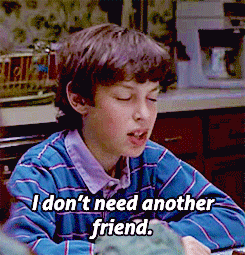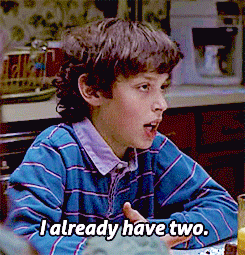
Shared posts
emporioefikz: Amazing Metal Sculptures in West Oakland

http://emporioefikz.tumblr.com/

http://emporioefikz.tumblr.com/

http://emporioefikz.tumblr.com/

http://emporioefikz.tumblr.com/
Disfrazando al perro para felicitar las Navidades

El fotógrafo Peter Thorpe lleva 24 felicitando la Navidad con una simpática fotografía de su perro. Primero fue Paddy y luego le sucedió Raggle, pero nunca ha faltado a su tradición de una foto graciosa de su mascota con algún tipo de disfraz para hacerla mucho más divertida y darle un toque acorde con estas fiestas. A continuación tenéis algunos de los ejemplos más graciosos de la peculiar costumbre de este fotógrafo.









Vía: Gran Angular
December 30, 2014
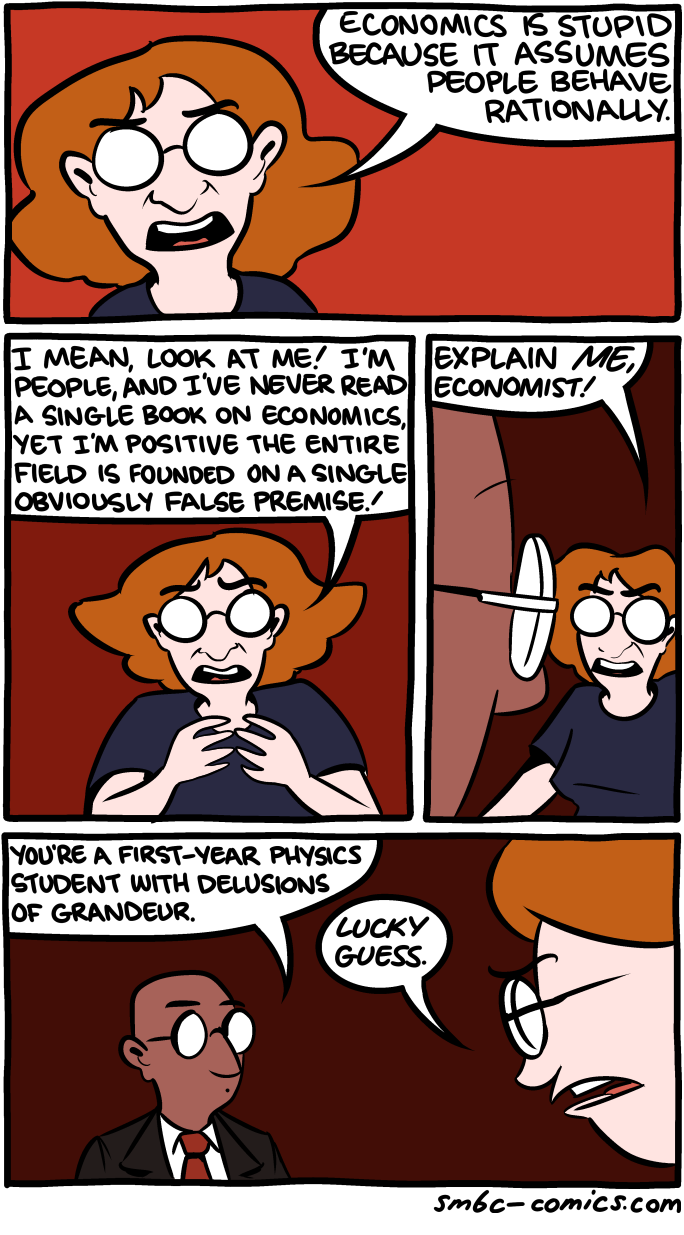
Hey Bostonoids! I'll be delivering a fake theory of economics that'll change the world at this event. This is free and open to the public, so please come say hi!
Marvel Vs DC: Equivalent Characters
TadeuDC and Marvel will be studied 2000 years from now just as we study Roman and Greek mythology.

How To Eat Your Cake: Consortium And The Fourth Wall
By Sin Vega on December 30th, 2014 at 12:00 pm.

We can’t keep saying video games are a young medium. We’ve been saying it since I was your age (or since you were mine, if that fits better), and besides, the last few years have finally shown that there’s plenty of room for games that do more than idly amuse us. Consortium is one such game.
Unlike any RPG I can name, Consortium throws you in with no map, no introductory cutscenes or tutorial. When you start, you don’t choose a character, you sign a disclaimer. It’s disorientating and strange, and immediately different, dedicated fully to its central conceit; you the player are accessing a satellite, provided by the developer, iDGi, that allows you to control a man known as Bishop 6, on board an aircraft, in the year 2042.
It nails role playing as a person in a specific situation, to an extent no other game has. Paradoxically, it achieves this by telling you nothing.

On hearing my blather, a housemate described it as “like Quantum Leap”, and with two caveats, that’s not a bad comparison. First, you only jump into one person, and second, there’s no Al or Ziggy to guide you or tell anecdotes about various wives, and no compulsion to do good, or indeed, to do anything, beyond what is normally expected of Bishop 6.
Other characters can’t be interrogated for exposition, as you’re supposed to know this stuff. This isn’t a world waiting for a generic adventurer to show up for a guided tour; it’s an important place of work, and you’re an integral part of it. Asking too many daft questions will make you look incompetent or stupid, which only makes crewmates worry and mistrust you. You can still do it though. You can be as stupid or unpleasant as you like. The game won’t judge you, although individual characters might.

Consortium casts aside some of the genre’s most common conventions, but it doesn’t tear down the medium or the hobby. Several characters are keen gamers, openly chatting about their world’s videogames, including some about your employers, the titular Consortium, like soldiers playing CoD, or HR staff playing that game where you’re a moron literally all the time. They do this conversationally, resisting the temptation to thrust a hand into the air and go “ooh, that’s like the videogame you’re playing right now!”
Neither does it fall into that awkward groove that (for example) Far Cry 3 and Spec Ops The Line fell into, clumsily critiquing their genre by forcing the player to act like a horrible fool, then calling the player out for being a horrible fool. As some big wally or other said, such games want to have their cake and eat it. “Are you not entertained?”, they cry, somehow ignoring the possibility that we’re grown people who are well aware that shooting thousands of people for fun would not be plausible or morally acceptable in the real world. It doesn’t work. Yes, we are entertained, and what’s more, I for one don’t feel the least bit bad for that. You’re not real, Maximus, and attacking us for taking part only draws more attention to that.

There’s no shortage of ambitious games content to explore storytelling techniques without insulting the player, either, but all too often the ludo- complement to the -narrative feels almost as flat and restrictive as… well, Ludo. We’ve surely all played a game with a story so intrusive, incongruent, or our options so restricted, that all impact or sense of agency was lost. While it’s easy and sometimes fair to blame bad writing, I’d say a more significant culprit is simply an inadequate grasp of the medium, and how we like to experience it.
Even the generally great Deus Ex Human Revolution fell flat there when it revealed the dramatic consequences of slacking before starting its opening mission. Uh, hell yeah I dawdled in the lobby. It’s Deus Ex! I was checking every inch of the level for secrets, and/or seeing what happened if I jumped off the third floor onto a receptionist’s head. Duh. By contrast, iDGi know how we play games, and rather than judge us for it, they embraced it, and integrated it into the core concept of their game.

In this world, they’re allowing you to do what you like. Most actions you carry out affect events in some way, and any result is as valid to them as any other. See, they’re interested in exploring possible futures, and each time you act, you create a new one. You’re confronted with several mysteries as you go, but provided you stay alive, there’s no right course of action. Every play through is as useful as any other, because they’re all possibilities.
This extra layer of plot between you as the dimension-jumping controller of Bishop 6, and you as the person sat at a PC, provides protection against that jarring moment where a developer tries to get clever with the fourth wall, but rather than impressing, succeeds only in clumsily reminding you that you’re a neurotic weirdo sat at a stupid whirring box of circuits, pawing at lumps of plastic like an idiot. It keeps you from reloading the game any time a conversation option didn’t get you the reward you wanted – these are people, not devices to feed you the next stage of a quest, and however you interact, they’ll give you something back. Even when you’ve finished, your game will be saved as a numbered universe, readily annotated with details of your actions.

Take one conversation with a young crewmate. He enthuses about just meeting a real live Bishop, and offers to make you a coffee, practically humping your leg. React with bemusement or disdain (saying nothing is always an option, as is simply walking away), and a nearby officer will make a wry remark about him having played too many video games. But it’s a good-natured, accurate comment. It’s neither a jab at gamers nor a clever pat on its own back for identifying that HEY GUYS THIS IS A VIDEOGAME HO HO. It’s just a story acknowledging that games exist, as it does with tv, films, and books, and yeah, there would totally be games about the Consortium if it were real.
Later, another NPC might take you aside conspiratorially and hint that they knew what’s really going on with you. And then you might tell them you’re from another dimension and they flip out, thinking you’re mocking them. There’s your relationship with them marred, and any opportunity to find out what they were really talking about gone. Oops. With very few exceptions, it knows exactly when and how far to nudge the fourth wall to explore a plot point or tease a mystery, and when to leave it alone to maintain the illusion.

What’s most remarkable is that this is all done in service of the game. Its encouragement of, and the wealth of alternative material provided by multiple playthroughs keep you invested – you can always make that decision differently next time, and it’ll likely offer a new experience. The notion that you’re secretly controlling this person drops you square into that situation with no information but what you can figure out through context. The practical setup brings added subtext to several events – when characters start dropping hints that they know a secret about you, you’re not pulled out of the game by an NPC having an existential crisis; instead, you’re hit with multiple reasons to be paranoid. Do they know you’re not who you claim to be? Is there something about Bishop 6 that I need to know? Is that creepy story in the news relevant or just flavour text? Why am I being allowed to do this, anyway?
None of this would work in another medium. Consortium offers a solid sample of what we’ve been saying games have the potential to do for a generation. That it’s also an entertaining game in its own right certainly doesn’t hurt, and with the questions it leaves unanswered and talk of a sequel, it might just be a stepping stone to something truly special.
Best of 2014: Evidence Grows That Online Social Networks Have Insidious Negative Effects
Tadeu2015 is the year of everybody leaving Facebook
In August, a study of 50,000 people in Italy concluded that online social networks have a significant negative impact on individual welfare.
Online social networks have permeated our lives with far-reaching consequences. Many people have used them to connect with friends and family in distant parts of the world, to make connections that have advanced their careers in leaps and bounds and to explore and visualize not only their own network of friends but the networks of their friends, family, and colleagues.
Two Days, One Night
mikeyfriskeyhands: My brother saved this document and everytime...

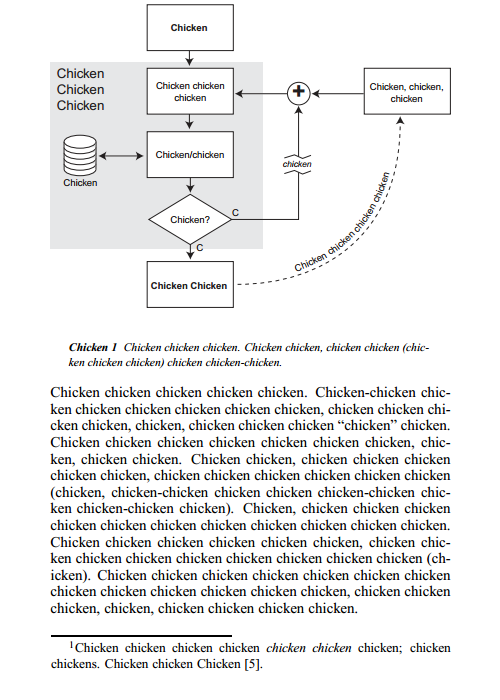
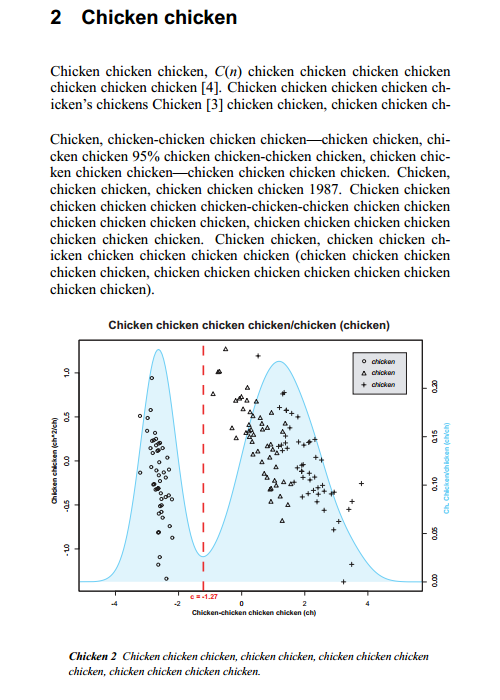



My brother saved this document and everytime he gets angry at our neighbours for being loud he prints it to their wireless printer and you can hear the wife shout “Why the fuck would you print this AGAIN?!” to her son.
Uncanny Moments on the Streets of China Photographed by Water Meter Reader Tao Liu

The 32-year old Tao Liu knows the city of Hefei like his backyard. Since 2005 he’s traveled up, down and across the city in Eastern China on his motorbike reading water meters for a local utilities company. The job was tedious, exhausting and unrewarding, until he picked up a camera.
For the past 3 years Liu has used his spare time to capture intimate, witty and humorous street photos of Hefei. “I like taking photos because I can hang around on the streets and capture an image when something interested me but was neglected by others,” Liu told the Global Times. “I want to remind people of the touching moments in life.” He was interviewed after his photos went viral on China’s social network Weibo.
Liu has no formal training in photography but cites Daido Moriyama – often referred to as “the father of street photography” – as a primary influence. “I found him [to be] a very focused photographer,” says Liu in an interview with TIME. “I chose my camera based on what he uses.” Liu’s photos, intentionally or not, seem to poke fun at things like commercialization and urbanization. Liu clearly has a knack, not only for being in the right place at the right time, but for a keen eye that spots charming, serendipitous scenes amongst the hustle and bustle of everyday life. You can keep up with him and his work on Lofter. All photos courtesy the photographer. (via Time)










liddo-cait: i reblogged this before but we actually started...


i reblogged this before but we actually started playing this game and it has resulted in spilled drinks, flying cigarettes, and friends getting hit in the gut with 5lb crystal balls
it is fantastic
изумление

В комментариях к посту про опрос ВЦИОМ был очень правильный и бесполезный вопрос о том – что считать хорошей книгой? Понятно, почему правильный – должны быть какие-то критерии. И понятно, почему бесполезный – мало того, что эти критерии у всех разные, так еще и со временем они постоянно меняются. В детстве вы с восторгом наблюдаете за сюжетом, потом начинаете ценить идеи, заложенные в книге, затем разбираетесь в оттенках и полутонах стиля автора, а потом вас пробивает на морализаторство
Попробую рассказать о своих критериях.
Для меня хорошая книга – та, которая вызывает радостное удивление. Это некая айдасукинсынность. Хорошую книгу обязательно хочется перечитать. Мне кажется, что если книгу не стоит читать во второй раз, значит ее можно не читать и в первый (кстати, именно поэтому хорошая книга обязательно должна быть в твердой обложке – она должна выдерживать множество прочтений). И с этой точки зрения для меня Борхес и Сэлинджер – хорошие авторы, а Пруст и Достоевский – плохие.
И проще понять, что такое хорошая книга через плохую. Как бы это лапидарно ни звучало. Плохую книгу определить гораздо проще.
Внутри читателя должна зазвенеть струна. Все знают историю про мын? Не может быть мына у Донцовой, которая пишет по десять романов в год. Это конвейер. А произведение нужно бережно выносить – иначе получится недоношенный калека. Конвейер – это Голливуд. Именно поэтому невозможно смотреть все американское кино с безумным бюджетом. Его снимают испуганные насмерть продюсеры, которые боятся провала. Слишком большие деньги на кону.
И вы все знаете заранее. Вы знаете, что дольше всех в боевике проживут самые дорогие актеры. Что зло почти уже победит, но в самый последний момент произойдет чудо. Что в конце фильма будет поединок между Главным Плохим и Главным Хорошим. И ГП уже почти победит и торжествующе расскажет весь свой коварный план (чтобы самые тупые зрители в зале поняли что к чему), но потом ГХ вспомнит о своем ребенке, жене или родине, соберет все свои силы и победит. Но ГП не погибнет – он еще пригодится для продолжения. А специальный отдел шуток в редакторском департаменте придумает несколько убойных гэгов – чтобы зрителям было чем обмениваться на выходе из кинотеатра.
Смотреть в сотый раз про встречу главного героя со своей заплаканной любимой на фоне заката невыносимо.
У Бродского в Нобелевской лекции было про это: «Искусство вообще и литература в частности тем и замечательно, тем и отличается от жизни, что всегда бежит повторения. В обыденной жизни вы можете рассказать один и тот же анекдот трижды и трижды, вызвав смех, оказаться душою общества. В искусстве подобная форма поведения именуется "клише"».
А хорошему автору плевать на клише. И на Чехова с его «Если в первом акте пьесы на стене висит ружьё, то в последнем акте оно непременно должно выстрелить» – тоже плевать. Он вам десять ружей на стенах развесит. И может все выстрелят, а может и ни одно. Ему ружей не жалко. Он не бережет их для десятой книги про Евлампию Романову или для двадцатой про Виолу Тараканову.
Интересно, что у одного и того же автора струна может звучать, а может и нет. Прекрасный пример – Пелевин. По определению Каганова все его творчество можно разделить на две части – метабуддизм и метасатанизм. И про метабуддизм (побег из Ада жизни) мне интересно читать и я люблю «Затворник и Шестипалый» и «Чапаев и Пустота», а метасатанизм (сотрудничество с Правящим Злом) мне органически противен. И я считаю редкой дрянью «Empire V» и «Бэтман Appolo». По этой же причине мне неинтересен Сорокин. Когда Ларс фон Триер проводит зрителя через ад в «Рассекая волны», в конце у зрителя есть шанс пережить катарсис. Когда это же делает деструктор Сорокин, в конце книги читатель остается с говном на палочке. Каким бы великолепным стилистом ни был Владимир Георгиевич.
Буду признателен по поводу ваших мыслей о хороших книгах.
p.s.
На всякий случай – история про мын
Всемирный фестиваль и конкурс традиционной кочурской музыки в столице Кочуристана. Выступает молодой, но очень энергичный кильмандарчи. Уж и так он умеет, и сяк, и в учумском стиле, и в кочумайском, и танцы такие, и баллады сякие... Отыграл, сидит в первом ряду довольный. Тут на сцену поднимается старик - то ли поддатый, то ли всегда такой, кильмандар потертый, царапаный даже, струна одна из бараньих жил, другая вроде как от мандолины, да и не строит малость... Поиграл немного, да и ушел. И надо же - дают ему первое место на конкурсе. Наш молодой чуть умом не тронулся, бежит в жюри, спрашивает - как так?
- А так, - говорят ему. - Играешь ты лучше, тут вопросу нет. Но вот мына у тебя нет. У него мын есть, а у тебя нет.
- Да какой еще такой мын? - тот кричит. - Что он вообще такое? Где его взять?
- Что он такое, и где его взять, мы не знаем, - отвечают аксакалы. - Но только вот у него он есть, а у тебя его нет.
End-Credits Timelapse in ‘Boxtrolls’ Brilliantly Reveals the Hidden Labor of Stop Motion Animation
One of the most gratifying aspects of watching stop-motion films is the knowledge that every bit of motion seen on screen is created by human hands, frame by frame, millimeter by millimeter. While an animator might tell you it takes an entire day just to film a 3-second sequence, it’s still difficult to imagine how much physical labor is involved to accomplish it. Lucky for us, the animators behind Laika’s Boxtrolls snuck in a short post-credits timelapse that reveals a brief glimpse of what happens behind the scenes to make two characters come to life.
I first saw Boxtrolls in the theater last September with my son, and this single scene caused a more vocal response from the audience than any other moment in the entire movie. People were literally gasping, myself included. Over the holidays, Focus Features finally made it available online through their YouTube channel.
This Magnificent Comic Strip Lays Waste to the Anti-Vaxxer Movement so Completely, It May Never Recover
TadeuThe more complete version!
Can we, at this point, just call out the anti-vaxxer movement for what it is? “The Logical End to Hipsterism.” Because that’s it, isn’t it? In this age, when everybody is aware of everything everyone else does, nobody feels like a special snowflake anymore. So, to a certain group of people, the natural psychological reaction is to just do things that are unpopular. To go against The Herd. But some things are popular for a pretty good reason. Things like breathing, eating and vaccinating your kids. Sometimes, it just doesn’t pay to think Opposite Day. But really…can’t you just imagine certain people, angrily grabbing phials of vaccine, exclaiming: “HERD IMMUNITY?! I don’t need your HERD immunity! I THREW IT ON THE GROUND!!”

The following comic strip, though, may just be the vaccine against Hipster Anti-Vaxxinism. Which, by the way, is a disease contracted only by people who never heard their mother say “Starving kids in Africa would die for the needle you’re getting…and they do.” This utterly brilliant piece of infotainment was penned by Maki Naro, published on Medium.com’s The Nib. If it looks remarkably polished and refined, there’s a reason for that — Maki is a professional cartoonist for Popular Mechanics. He’s called the John Hodgeman of Comics, and other pieces like “Monkey See, Monkey Make Logical Fallacy” and “Ebola: A User’s Guide” certainly lend some credence to the claim.
For more cartoons from Maki, visit The Nib, or subscribe to his Twitter feed. Until then, here’s hoping he’s found the cure to the pandemic of Hipsterism. Found it…AND THREW IT ON THE GROUND!!
Wait. No. Anyway.
Here’s a comic strip about children dying of preventable diseases.
















H/T: DeadState
asylum-art: Famous Musician Portraits from Their Own CDs -...









Famous Musician Portraits from Their Own CDs - Mirco Pagano & Moreno De Turco
It’s very popular to create musicians portraits from vinyl records or recycled cassette tapes. This time the following portraits were created from cds. For the inauguration of First Floor Under, a pop-vanguard culture magazine, artists Mirco Pagano & Moreno De Turco spent more than 200 hours lining up the CDs to recreate the portraits of seven world-famous musicians: Bob Marley, Elvis Presley, Jim Morrison, Jimmy Hendrix, Michael Jackson, James Brown, and Freddie Mercury. Take a look!
Wow. Very cool. But… where da women at? What, no Janis? No Nina? No Joan? No Tina? No Madonna?























